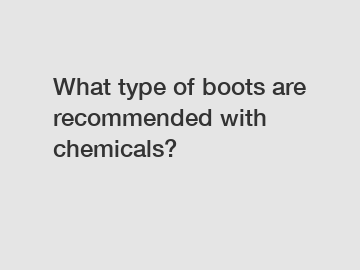What type of boots are recommended with chemicals?
What type of boots are recommended with chemicals?
Chemical handling is a common task in industries such as manufacturing, construction, and agriculture. Workers in these fields are often exposed to various hazardous substances that can have detrimental effects on their health and safety. To protect against such risks, it is crucial to wear suitable personal protective equipment (PPE), including the right boots. But what type of boots are recommended when working with chemicals? Let's explore this question and discuss the various considerations when choosing appropriate footwear for chemical-related tasks.
1. Material Composition:

When it comes to boots for chemical environments, the material composition is of utmost importance. The boots should be made of a material that can resist the specific chemicals you will be working with. Rubber and neoprene are popular choices due to their excellent resistance properties against a wide range of chemicals. These materials provide a reliable barrier, protecting your feet from potential harm.
2. Chemical Resistance:
Different chemicals have different levels of aggressiveness, and it is crucial to consider their compatibility with the boots you choose. Ensure that the boots you select are resistant to the specific chemicals present in your work environment. Consult chemical resistance charts or seek guidance from manufacturers to determine the suitability of boots for a particular chemical. Remember that no boot material guarantees resistance against all chemicals, so choose wisely based on the nature of your work.
3. Boot Design and Construction:
Apart from material composition and chemical resistance, the design and construction of the boots also play a significant role in providing adequate protection. Consider features like reinforced toes, which can protect against chemical spills or falling objects. Look for boots with no or minimal seams, as they reduce the chances of chemicals penetrating through the footwear. Additionally, boots with slip-resistant soles are crucial to preventing accidental falls and maintaining stability in chemical-laden environments.
4. Comfort and Fit:
While it is essential to focus on the protective aspects of boots, comfort and fit should not be overlooked. Chemical-related tasks often require long hours on your feet, so it is vital to choose boots that provide the necessary support and cushioning. Proper fit is also crucial to ensure comfort and prevent blisters or other foot-related issues. Consider trying on different brands and styles to find the boots that offer both protection and comfort.
In conclusion, when working with chemicals, selecting the right type of boots is crucial for personal safety and well-being. Boots made of materials like rubber and neoprene, with excellent chemical resistance properties, offer a suitable choice for chemical-related tasks. Considering the specific chemicals you will be working with, consulting chemical resistance charts, and seeking guidance from manufacturers can ensure that you make an informed decision. Additionally, paying attention to design features such as reinforced toes, minimal seams, slip-resistant soles, and a proper fit will further enhance your protection while providing comfort during long hours of work. By prioritizing your safety and finding the most suitable boots for chemical handling, you can reduce the potential risks and hazards associated with these specific work environments.
If you are looking for more details, kindly visit Food Safety Rubber Boots, Chest waders safety, what is eva sole in shoes.

Comments